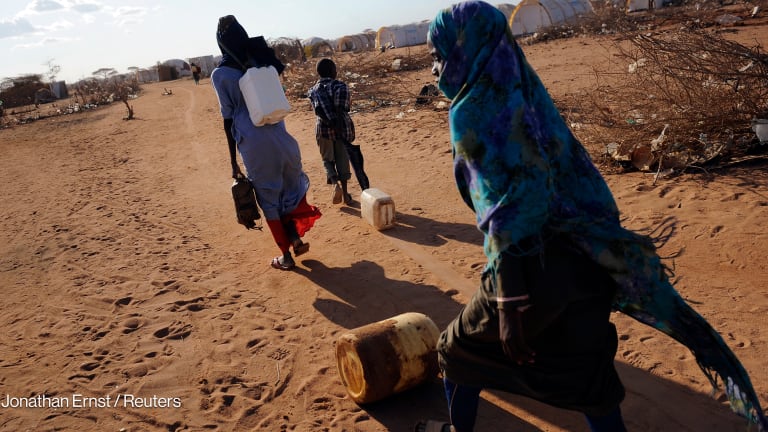Presented by Saudi Commission for Health Specialties

An international debt restructuring framework is meant to give countries a pathway out of economic paralysis. For some that are partway through that process, it is easier said than done.
Also in today’s edition: The chief justice of the U.S. Supreme Court weighs in on foreign aid spending, and the Africa Climate Summit ponders a renewable future.
+ Join us tomorrow for a Devex Pro Funding Briefing with Jordana Barrack, executive director of the Mighty Arrow Family Foundation. She will discuss how the foundation has shifted toward a trust-based approach shaped by direct feedback from its grantee partners.. Save your spot now.
Debt reckoning
Anthony Langat writes for Devex that Ghana — which defaulted in 2022 — has been undergoing debt restructuring under the G20 Common Framework, and has experienced both the ups and downs of that process. The effort has helped stabilize the country’s macroeconomic fundamentals — but everyday Ghanaian households continue to feel the strain.
The cost of living is high, and underemployment remains a huge issue for many Ghanaians, Anthony reports.
“Nurses who graduated from school and are still at home. Then there is the National Service, which we do in Ghana after University. Once you’re done with this compulsory serving, you stay in your house. There’s no employment for you,” says Klenam Dziewornu, an economics student at the University of Ghana.
Read: Ghana’s debt deal stabilizes economy, but not living costs
+ For more content like this, sign up to Devex Invested — the free weekly newsletter on how business, social enterprise, and development finance leaders are tackling global challenges.
Rally for change
The debt crisis reaches far beyond Ghana.
“Debt is not a sidenote in the development debate, it is the fault line upon which progress now stands or falls,” writes U.K. parliamentarian Noah Law in an opinion piece for Devex.
According to Law, what’s needed is better alignment among advocates pushing for debt reform.
“My message to NGOs is this: We don’t need another Live Aid. But we do need to rally around a campaign that unites the public, civil society, and policymakers in demanding a level playing field for low-income countries. The stakes are too high for us to allow fragmentation to blunt our impact,” he writes.
Opinion: Time for a rally in global debt reform
GERD night and GERD luck
My colleague Ayenat Mersie is reporting from the Africa Climate Summit in Addis Ababa, Ethiopia. She tells me that Day 2 of the summit was buzzing — though with some notable absences. Ethiopian Prime Minister Abiy Ahmed, accompanied by dignitaries including the Kenyan and Somali presidents, flew west to cut the ribbon on the Grand Ethiopian Renaissance Dam. The 5,150 megawatt project — Africa’s largest — has been under construction since 2011 and remains a bone of contention with Egypt, which says it threatens its share of the Nile River. Addis Ababa counters that the colonial-era rules are outdated and argues the dam is essential in a country where nearly half the population still lacks electricity.
Indeed, GERD is just the tip of Africa’s renewable iceberg. Back at the conference, Helen Mountford, president of the ClimateWorks Foundation, pointed out that Africa’s renewable energy potential is 10 times what the continent will need in 2040 — a resource that could create 14 million jobs.
Speaking of jobs, Nardos Bekele-Thomas, CEO of the African Union Development Agency-NEPAD, said carbon markets could create 30 million employment opportunities on the continent by 2050, lift 100 million people out of poverty, and generate $100 billion annually. It was the second packed carbon markets event of the day — the first had been so crowded that latecomers were turned away — underscoring the level of interest in the subject. The key to success on this front, Bekele-Thomas said, was “unshakable integrity.”
Indeed, the AU is developing African Integrity & Equity Principles for Carbon Markets, a framework to articulate the continent’s vision. The document is being shaped through stakeholder engagement and will be officially launched before COP30 in November, Bekele-Thomas said. AUDA-NEPAD is also building a continent-wide coordinating mechanism and a digital platform to track readiness by country for implementing Article 6 of the Paris Agreement.
Still, some African activists are skeptical of carbon markets, arguing they let polluters off the hook while shifting the burden of climate action onto the continent. “It’s a smokescreen for polluters,” said Mohamed Adow, founder and director of Power Shift Africa.
Stay tuned for updates from the third and final day of the summit tomorrow.
Related: A new how-to guide on carbon markets
Rescissions rollercoaster
My colleague Adva Saldinger has been keeping her eye on the courts, where the fate of U.S. foreign aid funding is currently under review. And surprise, surprise, there’s yet another development in the legal challenges to the Trump administration’s spending — or lack thereof — on foreign assistance. U.S. Supreme Court Chief Justice John Roberts temporarily lifted a lower court order that would have required the Trump administration to spend all of the foreign aid funds Congress appropriated that are set to expire on Sept. 30, the end of the fiscal year.
Roberts ordered a pause of a lower court’s injunction on Tuesday, as the full court considers the matter.
Roberts’ order applies specifically to the funds that are part of the “pocket rescission” proposal that the administration sent to Congress late last month, with limited time for Congress to respond to it before funds expire.
The next filing in the case is anticipated on Friday, and the Supreme Court is expected to move quickly on this issue. Of course, if Congress chooses to take up the rescission proposal and approves it, the particular issue in the case would be suddenly moot.
ICYMI: US foreign aid legal showdown heads to the Supreme Court
Further background reading: Court watch — the latest on the USAID docket
Budget basics
It can be tricky to write about the current U.S. foreign aid budget situation, because as soon as we share the latest update, we’re hit with the latest new — often eyebrow-raising — development.
Because things have been so fast and furious, a couple of colleagues and I decided to step back and try to put some of the breaking news related to U.S. foreign assistance spending in the context of the U.S. budget process — how it usually works, how things have changed under the Trump administration, and where we might go from here.
You can check out that special edition of our weekly podcast, in which Adva and I try to help our British editor make sense of a foreign aid budget process that has gone from confusing to extremely confusing.
Listen: The US budget deadlock explained
+ For Devex Pro members, I’ve recently launched a limited-time special Saturday edition of our Pro Insider newsletter, where I examine some of the biggest questions about the evolving realities of U.S. aid. Not yet a Pro member? Start your 15-day free trial today to access all our expert analyses, insider insights, funding data, events, and more.
In memoriam
Ambassador William Garvelink — whose career spanned decades of U.S. humanitarian response efforts — died last month at the age of 76.
“His tireless efforts helped to redefine the role of emergency humanitarian assistance as both a moral imperative and a pillar of American global leadership — a tool through which the U.S. could build trust, unlock diplomacy, and project its highest ideals into the world’s hardest places,” writes Garvelink’s former colleague, U.S. development expert Daniel Runde, in a Devex obituary.
Read the obituary: William Garvelink, a humanitarian in the American interest
+ We believe the impact of the lives of the members of our global development community is worth remembering. As we expand our obituary section, we invite you to help us pay tribute to those who have passed. If you’ve recently lost a colleague, friend, or loved one or know someone in the community who has, please consider letting us know via editor@devex.com.
In other news
For the first time, UNICEF reports that ultraprocessed foods have led to more children being overweight than underweight. [BBC]
Since its launch in 2020, the WHO Foundation has increasingly relied on anonymous corporate donations, which accounted for 80% of its 2023 funding, raising concerns over conflicts of interest in global health governance. [The Guardian]
U.N. chief António Guterres has warned that record global military spending, which surged to $2.7 trillion in 2024 and is projected to reach $4.7 trillion to $6.6 trillion by 2035, is outpacing aid and poses a serious threat to peace and development. [Xinhua]








